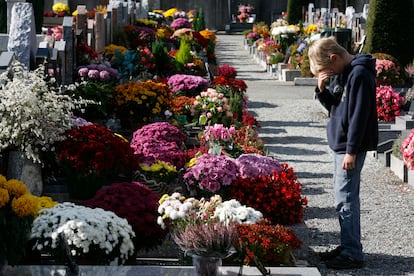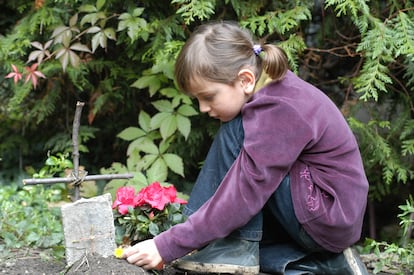How to help your child cope with the death of a loved one
A minor needs his parents to talk at home about deaths openly, without euphemisms that confuse him or meaningless explanations: teaching them to face of death is teaching them to face life


The topic of loss and death takes center stage on All Saints’ Day, which is celebrated on November 1. While in many homes, it remains a taboo subject, it’s something we must talk about with our children and young people. Adults find it difficult to discuss death because we do not want our little ones to get upset; the topic makes us feel insecure, distressed and many other feelings.
It is very difficult for families to support a child who has suffered the loss of a loved one. Someone the minor adored, with whom they shared their worries and joys, and who they needed by their side. An important person in their daily life who supported them when things went wrong and encouraged them to learn and improve.
It is very difficult and sad to see a child crying inconsolably knowing that they will never see their mother, brother or grandfather again. Keep calm when they start looking for someone to blame for an incurable illness or a random traffic accident. When the child collapses, sadness and nostalgia take over. It’s difficult for an adult to share the pain they feel from their loss without themselves collapsing. It’s difficult for them to hold on when they are the ones who do not have the strength to go forward.
Life and death go hand in hand, they are an unavoidable part of existence. Educating children in the face of death is part of life and should be part of the emotional education of the family and school. Children and young people must develop the necessary strategies to be able to face a loss so that they have a way of responding to their pain. They must learn to face it naturally by giving a name to all of their fears.
This is an education for which families must prepare well for if they want to properly respond to the needs of the child or young person. A child needs their parents to talk about death openly at home, without euphemisms that confuse them, or meaningless explanations or lies that make them believe that they will one day be able to see their deceased loved one again.

It is key that the adults supporting the child or young person feel able to talk about death or loss with calm and empathy. They should be clear, depending on the age of the child, about what they may or may not understand. They should learn to calm emotions that are painful and stir the heart.
Educating a child about death will help their personal growth, allowing them to build new concepts about health, sadness and happiness, the meaning of life and their relationships with those around them. This is key training in the development of emotional intelligence and empathy.
Keys to helping a child or young person cope with the loss of a loved one:
- Teach a child or young person about death before a loss happen. This allows them to familiarize themselves with this reality and face it with more security and less uncertainty. A child must know that it is natural, universal and irreversible, that it is part of the natural process of life and that no person or animal can avoid it.
- Promote open and honest communication with the child or adolescent, answering all their doubts about death and the grieving process from a calm and loving place, using simple language that they can understand. Do not lie to them or hide anything that may be important to them. We must adjust our explanation to the child’s age, their life experiences and circumstances.
- Openly share all the emotions that the topic can stir in us. Facilitate spaces to share our feelings or doubts, creating a climate full of love, understanding and affection. We should not try to hide our tears or our sadness when we remember a person who is no longer here.
- If we have to support a child or young person to cope with the loss of a loved one, we must encourage and allow them, whenever they wish, to participate in the farewell rituals organized by the family. Sharing pain, sadness and anger with the people who loved and cared for them will help the child to better accept the loss and to feel that they were someone valuable within the family. Keeping alive the memory of the person who has died by remembering them will help the child heal their wound.
- Help them navigate and understand the different stages of grief. This will allow the child or teenager to overcome the loss in a calm and constructive way. Validating their anger, sadness, or frustration until they come to terms with the death of the loved one is a key part to overcoming the pain.
As Professor Jon Kabat-Zinn says: “You can’t stop the waves, but you can learn to.” Death is the end of the life cycle that we all, at one time or another, must face: teaching them about death is teaching them about life.
Sign up for our weekly newsletter to get more English-language news coverage from EL PAÍS USA Edition
Tu suscripción se está usando en otro dispositivo
¿Quieres añadir otro usuario a tu suscripción?
Si continúas leyendo en este dispositivo, no se podrá leer en el otro.
FlechaTu suscripción se está usando en otro dispositivo y solo puedes acceder a EL PAÍS desde un dispositivo a la vez.
Si quieres compartir tu cuenta, cambia tu suscripción a la modalidad Premium, así podrás añadir otro usuario. Cada uno accederá con su propia cuenta de email, lo que os permitirá personalizar vuestra experiencia en EL PAÍS.
¿Tienes una suscripción de empresa? Accede aquí para contratar más cuentas.
En el caso de no saber quién está usando tu cuenta, te recomendamos cambiar tu contraseña aquí.
Si decides continuar compartiendo tu cuenta, este mensaje se mostrará en tu dispositivo y en el de la otra persona que está usando tu cuenta de forma indefinida, afectando a tu experiencia de lectura. Puedes consultar aquí los términos y condiciones de la suscripción digital.








































